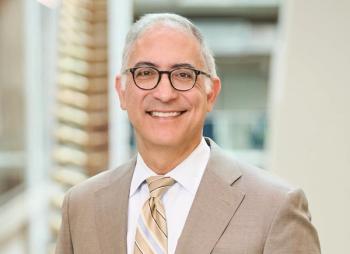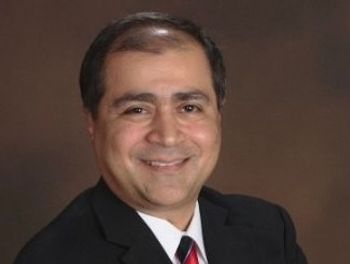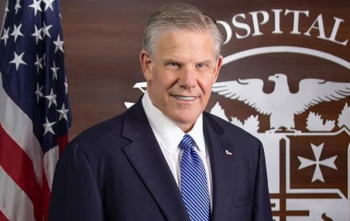
Executive Voices: Karen Murphy, Ph.D., R.N., Chief Innovation Officer of Geisinger
Innovative payment models and solutions can help rural communities receive higher-quality care.
Rural communities often struggle to access affordable, high-quality healthcare. At the same time, these patient populations also suffer from some of medicine’s greatest challenges, from opioid use disorder to chronic conditions like Type 2 diabetes.
But
Before her work at Geisinger, Murphy served as Pennsylvania’s secretary of health and as director of the State Innovation Models Initiative at the Centers for Medicare and Medicaid Services. Murphy earned her doctor of philosophy in business administration from Temple University Fox School of Business and has a master’s of business administration from Marywood University. She received a nursing diploma from the Scranton State Hospital School of Nursing.
Samara Rosenfeld: How is Geisinger tackling innovation?
Karen Murphy: Geisinger has had a national reputation for innovation for the last 20 years. We’ve had several successful, widely adapted innovations, such as ProvenCare and ProvenExperience.
In 2017, the organization decided to launch an institute for health innovation. The purpose was to bring innovation to the next level or third generation. We formed the Steele Institute for Health Innovation in July 2018 and launched an enterprise-wide institute for health innovation. The first order of business was to define innovation at Geisinger. Our definition is, “a fundamentally different approach to solving a problem that has quantifiable outcomes.” That guides all of our work.
We group our work into four pillars.
S.R.: And what are these pillars of innovation?
Karen Murphy: The first pillar is health. Included in that pillar are innovative approaches to population health and social determinants of health.
We have our Fresh Food Farmacy, which is a program that offers food to food-insecure Type 2 diabetics. The idea is that through healthy foods, we can control diabetic disease and slow its progression down. We have seen significant results in patient reported outcomes and decreases in hemoglobin A1c.
Another program under the health pillar is Free2BMom. This was designed for moms with opioid use disorder. We really step in and wrap our arms around moms who are pregnant when they enter medication-assisted treatment. We stay with them for two years with community services, a peer recovery specialist, social work. We provide a collaboration with 24 community agencies that look at all of the social determinants. We also partner with agencies to provide job training and try to take the needs of the mom and baby into consideration — both the psychosocial and health needs — to maintain the mom’s recovery.
Our second pillar is transformation of healthcare delivery.
We are looking at opportunities to transform how healthcare is delivered by leveraging technology and supporting new, innovative models of care. One of those models is the Pennsylvania Rural Health initiative, which is a federal-state partnership with the Department of Health and the Center for Medicare and Medicaid Innovation (CMMI). CMMI granted the state $25 million to launch a new payment methodology for rural hospitals. So, rural hospitals develop a transformation plan and they’re reimbursed on a global payment. The idea behind the initiative is to leverage rural hospitals and transform them into a more sustainable business model that meets their community’s needs.
Our third pillar is value. A big component of our work in value was launching a behavioral economics unit called Applied Behavioral Insights, which is a unit of behavioral economists that work with providers and our innovation team to develop nudges to encourage better decision-making.
The fourth pillar is environmental health. We are interested in leveraging the environment to improve health outcomes. We leverage what we know about the environment that can help combat adverse health outcomes caused by environmental factors.
S.R.: What kind of tools do you have to reach these goals?
Karen Murphy: We have a product innovation team that develops apps and other software innovations that help improve health and delivery and lower costs of care.
We have an artificial intelligence (AI) and machine-learning team, which we see as an area of great potential to improve our clinical work and to develop new care models, lower the cost of healthcare and improve business operations.
Finally, we have our data enterprise, which is a 20-year data repository of electronic health records in a unified data architecture that we’ve added other sources of data to. It gives us rich data to mine and leverage into making more effective decisions.
S.R.: When you worked for the state, you established the Pennsylvania Rural Health Model. Can you tell me more about that?
Karen Murphy: There are almost 700 hospitals across the U.S. that have been tagged as vulnerable to closure due to an unsustainable business model. So, in Pennsylvania, we attacked that by creating a new payment model, which is this multi-payer global payment. CMMI was very interested in studying the model, so they funded Pennsylvania.
We at Geisinger have a rural hospital called Jersey Shore, and the idea for hospitals participating in this model is to transform into a more sustainable model. The goal is to shift away from delivery toward community health needs. We want to concentrate on utilizing the money that is traditionally focused on rural hospitals that have declining inpatient admissions and are not sustainable as an acute-care hospital with multiple services. Instead, we want to take the dollars and shift them to the health of the community instead of just acute-care services. By shifting those dollars, you preserve the economic security offered through having a rural hospital and you maintain the economic security of maintaining the investment in the rural community.
S.R.: What challenges have you faced in shifting to this model?
Karen Murphy: The model is fairly new, and I think it’s going to take time to fully develop those transformative strategies. At Jersey Shore, we’re working on leveraging our health navigators. It has allowed rural hospitals the opportunity to bring in health coaches and work with patients on chronic diseases such as COPD. We will be looking at leveraging technology solutions to provide the customary services such as telehealth, but also different care models across all disease states, particularly chronic diseases.
S.R.: What can other health systems do to better focus on population health and social determinants of health?
Karen Murphy: There is recognition that, of the healthcare dollars that are spent, we are really allocating more to healthcare delivery when we should be putting more money into the social determinants. They really impact health. For individuals who are food insecure, it is very difficult to have better health if they don’t have good or healthy food to eat.
As health systems, we have to discover how we can work with community agencies and public-private partnerships. We must learn how to leverage relationships to address these needs.
S.R.: What are the biggest issues facing Pennsylvania that you hope to address?
Karen Murphy: We have our Springboard initiative, which is designed to partner health systems and community agencies on identifying each area’s specific health needs. We want to develop plans to leverage the resources of the health system and agencies.
Every year, we launch a program with Geisinger Commonwealth School of Medicine that delivers more than 10,000 meals to those who are food insecure.
S.R.: What are your thoughts on the Centers for Medicare & Medicaid Services focusing more on rural health? How can that help Pennsylvania?
Karen Murphy: I worked at CMMI before I was secretary of health, and the federal government definitely recognizes the needs of rural hospitals that could use innovative approaches. They have been extremely supportive in addressing our needs.
The government has been acknowledging the need to focus on the social determinants, which is extremely positive. The state of Pennsylvania has done tremendous work in addressing the opioid crisis. The Department of Health and Human Services has been active in developing and collaborating with health systems and looking at different approaches to addressing the social determinants.
I really do believe the community needs and the idea of addressing health in a different fashion than just looking at healthcare delivery has become something that is pretty well-ingrained in the culture of public policy.
Get the best insights in digital health
Hear from More Executive Voices







































